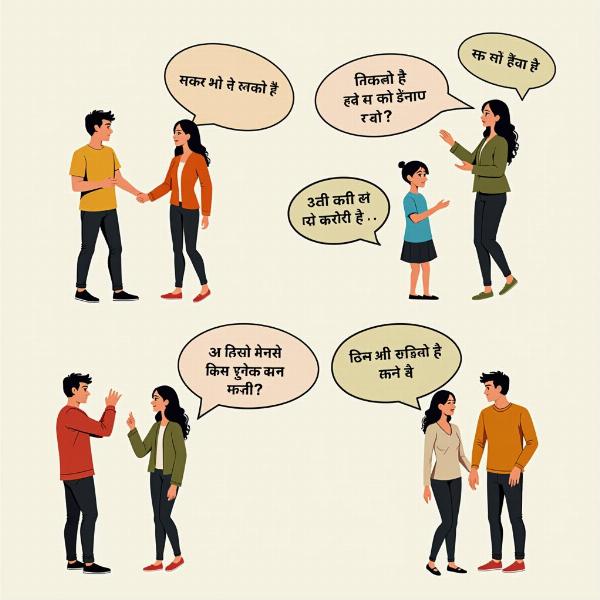Understanding the nuances of “totally” in Hindi can be tricky, especially for non-native speakers. This guide explores various Hindi translations of “totally,” examining their subtle differences and providing practical examples to help you use them correctly in different contexts. We’ll cover common equivalents, their cultural implications, and how to choose the most appropriate translation based on the specific situation.
Decoding “Totally” in Hindi: Various Translations and Contexts
The English word “totally” can be translated into Hindi using several words and phrases, each carrying slightly different connotations. Choosing the right one depends heavily on the context. Some common translations include:
- पूरी तरह से (pūrī tarah se): This is the most literal and common translation of “totally,” meaning “completely” or “fully.” It’s generally a safe choice in most situations. For example, “I totally agree” would be “मैं पूरी तरह से सहमत हूँ (main pūrī tarah se sahamat hun).”
- बिल्कुल (bilkul): This word translates to “absolutely” or “certainly,” emphasizing the definitive nature of the statement. It’s often used for strong agreement or emphasis. “That’s totally right” becomes “यह बिल्कुल सही है (yah bilkul sahi hai).”
- एकदम (ekdam): This word signifies “completely” or “absolutely” and is often used in informal settings. It adds a sense of immediacy and certainty. “I’m totally exhausted” translates to “मैं एकदम थक गया हूँ (main ekdam thak gaya hun).”
- पूरा (pūra/pūrī): Meaning “whole” or “complete,” this word can be used when referring to the entirety of something. “The cake was totally eaten” could be translated as “केक पूरा खा लिया गया (kek pūra kha liya gaya).”
 Understanding "Totally" in Hindi Conversation
Understanding "Totally" in Hindi Conversation
Choosing the Right Word: Nuances and Cultural Considerations
While the above translations are all valid, their subtle differences can significantly impact the meaning of your sentence. Using bilkul might sound too formal in a casual conversation, while ekdam might seem inappropriate in a professional setting. Understanding these nuances is key to effective communication.
For instance, if you’re talking about being “totally broke,” using pūrī tarah se (मैं पूरी तरह से टूट गया हूँ – main pūrī tarah se tut gaya hun) sounds more natural than using bilkul. However, when expressing strong agreement, like “I totally understand,” bilkul (मैं बिल्कुल समझता हूँ – main bilkul samajhta hun) conveys a more emphatic agreement.
Common Questions about “Totally” in Hindi
1. What’s the most versatile translation of “totally”?
pūrī tarah se is generally the most versatile and widely accepted translation.
2. How do I say “I’m totally fine” in Hindi?
You can say “मैं बिल्कुल ठीक हूँ (Main bilkul theek hun)” or “मैं एकदम ठीक हूँ (Main ekdam theek hun).”
3. Can I use “total” as an adjective in Hindi?
Yes, the word “कुल (kul)” is often used to mean “total.” For example, “total cost” would be “कुल लागत (kul lagat).”
4. Is there a slang equivalent for “totally” in Hindi?
Yes, words like pakka (sure) or full (full, used colloquially for emphasis) can sometimes convey a similar meaning in informal conversations.
5. How can I be sure I’m using the right word?
Pay attention to the context and the level of formality. When in doubt, pūrī tarah se is usually a safe bet.
Conclusion: Mastering “Totally” in Hindi
Mastering the different ways to say “totally” in Hindi is crucial for communicating effectively and avoiding misunderstandings. By understanding the subtle nuances and cultural implications of each translation, you can choose the most appropriate word for any given situation, thus enhancing your communication skills and deepening your understanding of the Hindi language. Remember to consider the context, the level of formality, and the specific meaning you want to convey.
FAQ
- What is the most formal way to say “totally” in Hindi? Pūrī tarah se is considered the most formal and generally accepted translation.
- Is “bilkul” suitable for informal conversations? While acceptable, bilkul might sound slightly more formal than ekdam in casual settings.
- What’s the difference between “ekdam” and “bilkul”? Ekdam carries a sense of immediacy and is often used informally, while bilkul emphasizes certainty and can be used in both formal and informal settings.
- Can I use “pūra” to mean “totally”? Yes, but mainly when referring to the entirety or completeness of something.
- What’s a slang way to say “totally” in Hindi? Words like pakka or full (used colloquially) can sometimes function as slang equivalents.
i totally agree with you meaning in hindi
it’s totally fine meaning in hindi
i am totally broken meaning in hindi
i totally agree meaning in hindi
Meaning-Hindi.in specializes in accurate and culturally sensitive Hindi translation services. We offer a wide range of services, including business, legal, technical, website localization, and academic translation. Need help conveying the perfect nuance of “totally” in your Hindi content? Contact us today at [email protected] or call us at +91 11-4502-7584. Meaning-Hindi.in is your trusted partner for all your Hindi translation needs.